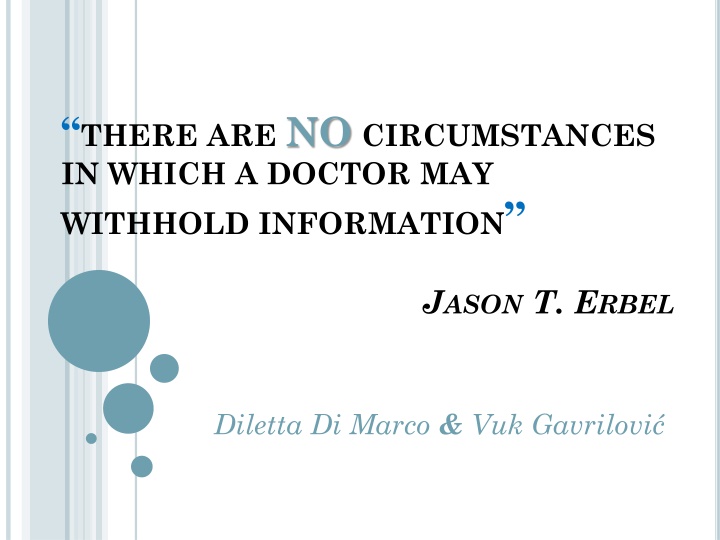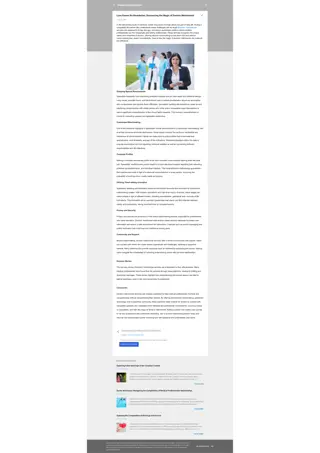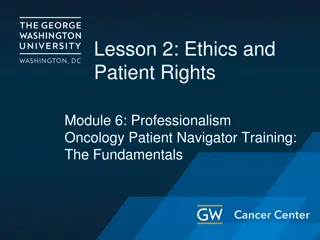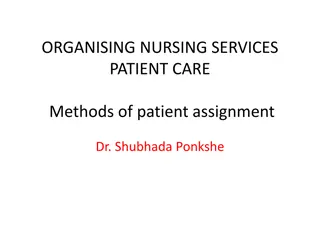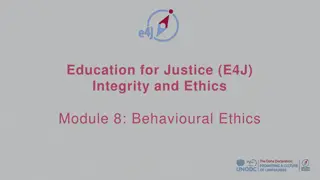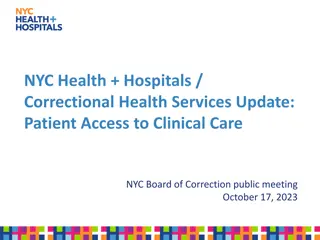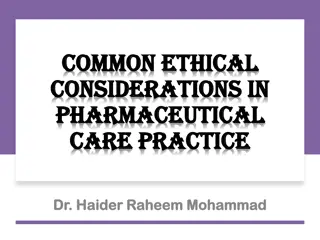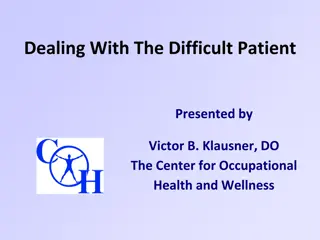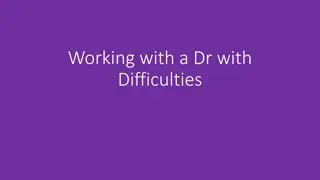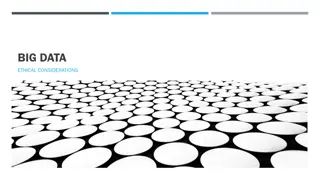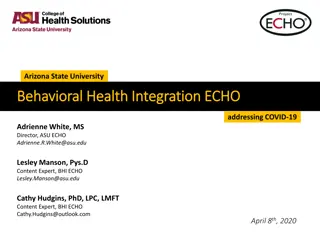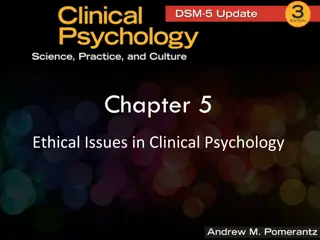Ethical Considerations in Doctor-Patient Communication
The debate on whether a doctor should withhold information from a patient revolves around the principles of autonomy versus beneficence. Various ethical viewpoints such as utilitarianism, libertarianism, Kantian moral imperatives, and Aristotelianism are explored. While some argue for disclosing all information to respect patient autonomy, others suggest potential harm in revealing certain details. Ultimately, the key lies in striking a balance between patient autonomy and the ethical responsibilities of a healthcare provider.
Download Presentation

Please find below an Image/Link to download the presentation.
The content on the website is provided AS IS for your information and personal use only. It may not be sold, licensed, or shared on other websites without obtaining consent from the author.If you encounter any issues during the download, it is possible that the publisher has removed the file from their server.
You are allowed to download the files provided on this website for personal or commercial use, subject to the condition that they are used lawfully. All files are the property of their respective owners.
The content on the website is provided AS IS for your information and personal use only. It may not be sold, licensed, or shared on other websites without obtaining consent from the author.
E N D
Presentation Transcript
THERE ARE NO CIRCUMSTANCES IN WHICH A DOCTOR MAY WITHHOLD INFORMATION JASON T. ERBEL Diletta Di Marco & Vuk Gavrilovi
WHAT IS THE DEBATE ABOUT? Essentially, it boils down to: AUTONOMY vs BENEFICENCE (arguably)
TABLE OF CONTENTS Arguments against withholding info: Autonomy Trust & Cooper. Theoretical views: Utilitarianism Libertarianism Kantianism Aristotelianism Exceptions Counterargument s to reasons why not to disclose
UTILITARIAN VIEW Lying to the patient is acceptable if it yields greater utility to the patient (or the overall population) BUT: It is acceptable only if that patient is not YOU. It is easy to want a global benefit when you are part of the globality , but what if you are the patient who is receiving a maleficent treatment or being lied to?
LIBERTARIAN APPROACH The autonomy is of paramount importance. It is the patient who makes all the decisions about him/herself and therefore must have all the necessary information autonomously (if the patient wishes it). to decide
KANTIAN MORAL IMPERATIVES Withholding information violates the moral imperatives set by Kant: You must always tell the truth, whatever the circumstance You must treat others as ends, not only as means to an end. Patients are autonomous and rational individuals, you must not do things that hinder their autonomy
ARISTOTELIANISM Persons are autonomous and rational individuals, they have their own preferences and ability to decide for themselves. Every person has his/her own idea of what constitutes well-being , and is entitled to pursue this personal idea autonomously. Therefore, you must give them all the information so they can pursue their ideal
REASONS WHY NOT TO DISCLOSE (COUNTERARGUMENTS) By disclosing all (e.g.) negative effects of a therapy, you might cause anxiety to a patient, hopelessness, other negative consequences or even suicide. The doctor might be making wrong assumptions on patient s psyche or not be qualified for such a decision or even a psychiatrist might be wrong! BUT: And even so, what s wrong with a rational choice to commit suicide? One should be free to decide autonomously if he/she wishes to end the suffering.
REASONS WHY NOT TO DISCLOSE (COUNTERARGUMENTS) Giving all the information and details (about a procedure or drug) might be impractical, or confusing and induce into a wrongful decision. True, BUT: There is a standard of substantial completeness , and a principle of materialrelevance . So, minutiae or negligible effects or details may be withheld if they are irrelevant and only if they do not impair the ability to make a rational and autonomous decision
REASONS WHY NOT TO DISCLOSE (COUNTERARGUMENTS) A patient might explicitly ask about not wanting to hear negative things. There might be an agreement which allows/obliges the doctor not to disclose some info. Acceptable, BUT: Only if withholding this information does not impair the autonomy of the patient and the ability to make a rational and informed decision.
ARGUMENTS AGAINST THERAPEUTIC DECEPTION AUTONOMY: rational Patients Withholding information infantilizes them, is disrespectful, infringes determination, and is an affront to dignity and autonomy. A view that autonomy is of paramount importance is shared among different philosophical approaches (Kantianism, Libertarianism, Aristotelianism, and arguably even Utilitarianism) are autonomous agents. the right to self-
ARGUMENTS AGAINST THERAPEUTIC DECEPTION TRUST AND COOPERATION: Hiding the truth undermines the trust in the doctor. It is in the best interest to be honest and cooperative. Only the patient knows everything about himself, and by having complete information from the doctor the patient might have relevant insight in his condition. Full trust = full cooperation = better results An alliance between doctor and patient is beneficial, and must be based on honesty and trust.
EXCEPTIONS: In case of emergency or impossibility to inform the patient If the patient is not fully autonomous or capable of rational decision-making and cooperation Temporary non-disclosure or staged disclosure is also acceptable HOWEVER: It must always be aimed at the ultimate wellbeing of the patient (beneficence is primary) The medical benefits of non-disclosure must be clear and direct Withholding information permanently is not acceptable Information must not be withheld only to give hope or to avoid a refusal of a treatment
FUNDAMENTAL PRINCIPLES BREACH
RIGHT TO HEALTH Art. 32 The Republic safeguards health as a fundamental right of the individual and as a collective interest, and guarantees free medical care to the indigent. No one may be obliged to undergo any health treatment provisions of the law. The law may not under any circumstances violate the limits imposed by respect for the human person. except under the
RIGHT TO PERSONAL FREEDOM Art. 13 Personal liberty is inviolable. No one may be detained, inspected, or searched nor otherwise subjected to any restriction of personal liberty except by order of the Judiciary stating a reason and only in such cases and in such manner as provided by the law.( )Any act of physical and moral violence against a person subjected to restriction of personal liberty shall be punished. The law shall establish the maximum duration of preventive detention.
INFORMATION CONTENT The information must include: The nature of the intervention or examination The scope and extent The risks involved The probable percentage of success Treatment options and their risks Any inadequacies of the structure, therapeutic and diagnostic tools
INFORMATION ARRANGMENT The information must be customized, according to the type of medical treatment required and the peculiarities of the individual patient, so as to place him/her under the best conditions for a real and conscious choice = The negligent conduct exists for the simple reason that the patient, because of the lack of information, it has not been put in a position to assent to treatment with conscious will of its implications
The consent Given by pre-printed form is incomplete and erroneous: the consent must be the result of a real relationship doctor and patient, in which the physician is required to collect an effective and adhesion, not just a document with which responsibilities. between participatory relieving the Such written support should therefore be thought of as a support to written in simple form, avoiding as much as possible the use of technical terms. the dialogue,
The doctor will be responsible in case of lack of information He/she will also be responsible in case of poor communication about the risks of discontinuation of treatment or omission of monitoring of therapy and possible side effects
THE BEST PROTOCOL The essential requirements that the doctor has to demonstrate to the patient: The clarity and comprehensibility of his treatments Traceability of who has drawn his medical records The accuracy and conformity of the data and information The relevance of the information recorded Completeness of all necessary data
CASE STUDY J. goes by his doctor in order to undergo analysis for celiac disease. In fact since few months he suffers strange symptoms. His analysis, however, are labeled in the wrong way by the nurse and put through the folders to be scanned for HIV testing. J. was negative to the text of celiac disease but positive to the AIDS virus. As J. did not sign the informed consent can not be made aware of the discovery. Was communicated to him that the negative outcome to celiac disease test.
What would happen if you were J. ?
SOURCES Arthur L. Caplan e Robert Arp (eds), Contemporary Debates in Bioethics, Wiley-Blackwell, 2013, pp. 409-427 Italian Costitution Roberts C, Torgerson D. Randomisation methods in controlled trials. BMJ 1998;317:1301. Legal information provided by Studio Legale PCMC (Palermo) The End
